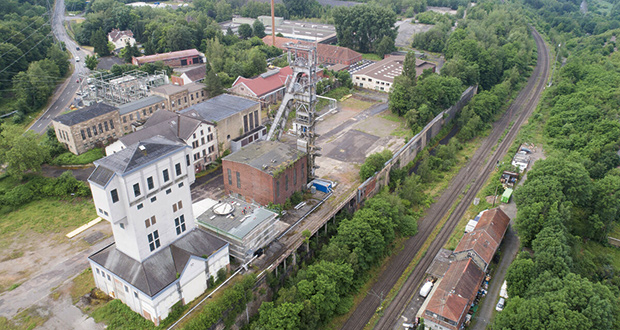After intensive preparations, Iqony Energies GmbH, Saarbrücken/Germany, a subsidiary of the energy company Iqony GmbH, Essen/Germany, has decided to modernise and convert its existing district heating generation plants and district heating network on the site of the former Camphausen mine into an innovative and climate-neutral heat generation system (Figure 1). Waste heat from mine water from RAG Aktiengesellschaft, Essen/Germany, will be tapped as a new heat source and made available for the district heating supply to the town of Sulzbach. This will avoid annual CO2 emissions of more than 6,000 t in the future.
The project had already received funding approval in December 2020 as part of a tender for “Innovative CHP energy systems” (iKWK) from the Federal Network Agency. Combined heat and power (CHP) plants generate electricity and heat at the same time and are therefore particularly efficient and resource-saving. However, extensive preliminary planning, many technical challenges and regulatory decisions in Berlin meant that the project could not yet be realised. Now, however, all the requirements have been met and realisation can begin.
In technical terms, the project consists of three coordinated components: a conventional CHP plant, the renewable heat source in the form of mine water and a heat pump that utilises the residual heat of around 36 °C contained in the mine water for the district heating supply.
“We are delighted to be able to help make a climate-neutral contribution to the heat supply with the mine water that we provide to Iqony. This mine water has a temperature that can definitely be used to generate heat,” says Michael Drobniewski, RAG Regional Representative for Saarland. Appropriate feasibility studies are therefore being carried out at all mine water drainage sites.
“Pumping the mine water naturally makes it much easier to tap into this unusual source of heat,” explains Dietmar Bies, who is responsible for the project on behalf of Iqony. The heat obtained in this way ensures a corresponding reduction in the use of conventional energy sources, meaning that the Camphausen CHP plant saves around 6,300 t of CO2 emissions every year.
Because the third part of the plant, the conventional CHP plant, is also fuelled by an energy source classified as climate-neutral, the plant as a whole is already completely emission-free.
Anke Langner, CEO of Iqony Energies: “We use mine gas as fuel in the conventional CHP plant, which has a high methane content. When released into the atmosphere unburnt, methane is more than twenty times more harmful to the climate than CO2. Accordingly, politicians have only recently confirmed the ice classification of mine gas as a climate-neutral fuel, which is why the use of mine gas as a fuel is also a sensible measure in the interests of the climate.”
What’s more, there will still be sufficient fuel available in the coming years. However, the legal categorisation of mine gas as an energy source was in limbo in the political debate for a long time. As a result, the realisation of the project in Camphausen also took longer than originally planned.
For the users of district heating in the municipalities of Camphausen and Sulzbach, including a hospital and industrial and commercial enterprises, this in turn means that the district heating supplied in future from the plant on the former colliery site is already green, i. e., climate-neutral.
It is not only against this background that Stadtwerke Sulzbach, as the local district heating supplier, and Iqony Energies have decided to continue their proven and successful collaboration and extend the corresponding cooperation agreement by 20 years. “We are delighted that we are continuing our cooperation and at the same time opening a new, climate-neutral chapter for the local heat supply with the conversion of the plant in Camphausen, which is now beginning,” says Langner. And Iqony has another piece of good news to report to the citizens of the two municipalities: “From a technical point of view, our plant still has potential to increase the generation of green heat. This means that nothing stands in the way of a possible expansion of a truly climate-neutral district heating supply on the generation side,” says Langner.
Construction work began in October 2023 and will take around 14 months. The plant is expected to be commissioned at the end of 2024. During the conversion phase, the supply of heat to the communities will be ensured at all times by means of mobile heating centres. (Iqony/RAG /Si.)



